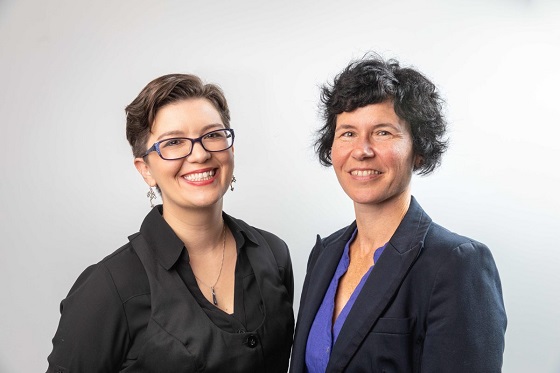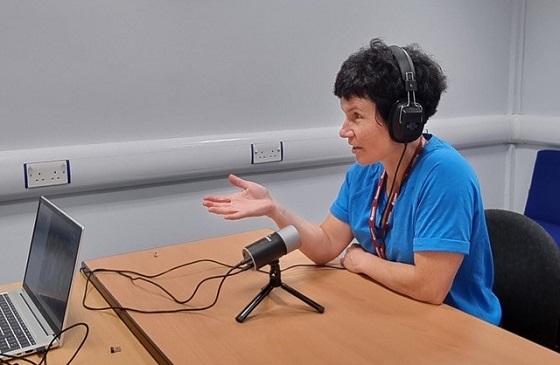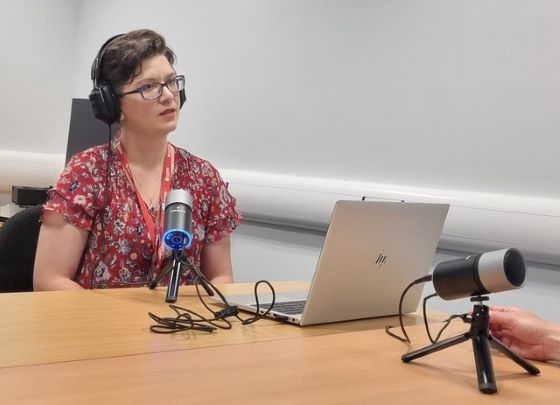They are the campaigning voices opening our minds to the joys, and challenges, of learning languages.
Passionate linguists and psychologists Dr Kaitlyn Zavaleta and Dr Marie-Josée Bisson use their podcast to spread the word - while asking listeners to help inform their research at De Montfort University Leicester (DMU).

Now into their second series of The Language Scientists, Kaitlyn and Marie – who are part of the group of DMU psychology researchers called the Language Lab – have picked each other’s brains and brought in other experts to discuss everything from training your ear for another language, why speech errors show good knowledge and using virtual reality to master a foreign tongue.
But one concerning issue for both of the researchers, who received funding for the podcast and research from the British Academy Talent Development Awards, is the lack of language learning in secondary and higher education in England.
They hope the podcast can put people at ease and help them discover how language learning can help expand the mind, create a more empathetic outlook on life and also benefit the economy.
Marie said: “One of the things the British Academy was really keen on was to fund projects that were related to language learning.
“There is currently a problem, mainly in England, with the uptake of language learning in secondary education and HE.
“Everyone has to learn Welsh in Wales so by the time they learn a foreign language they already have two languages under their belt.
“In Scotland you learn a foreign language in primary school and then you step it up.

Marie makes her point during one of the podcasts
“I used to teach French in England and it used to be compulsory in GCSE to take a foreign language. It has changed. Now you have to start a bit earlier in primary school but pupils do not have to continue a language after year nine. The Government is currently introducing initiatives to encourage language learning, investing £14.9m in language hubs.
“There are big changes coming to the modern languages curriculum. From 2024 there is going to be a word list for French, German and Spanish. It means students learn the most frequently spoken words to help construct sentences which I think is good news for learning.
“We need to bridge the gap between academia and the general public about language learning
“The podcast allows us to disseminate our research and the impact of learning research and change people’s attitude towards language learning.”
Kaitlyn, who speaks some French, Spanish, Latin and Arabic, added: “The podcast is a really nice medium for us to use to build networks beyond the ‘ivory tower’ of academia.
“Everyone in the world learns a language. It is not unattainable. You do not have to be at university level to follow the podcast. It is also helpful for children being raised in a bilingual household.
“Alongside our podcast, there is an online survey to ask questions about what the barriers are to language learning.

Kaitlyn during one of the recordings of the Language Scientists podcast
“We are also recruiting participants and measuring their attitudes to language learning before and straight after the podcast.”
So, what are the benefits of learning a language?
Marie, who is French Canadian, said: “Why languages? The empathy and open mindedness that comes with it.
“I speak to my children in French as much as I can. When we welcomed Ukrainians, my children were so empathetic of them learning a new language. They played with them and worked with them to make their English better. That was a very proud moment for me - that open mindedness and empathy.
“It does not mean someone is not intelligent if they struggle with a language. We have to be more flexible and more tolerant.
“It opens up cultures and opens up opportunities. We need language speakers to be more competitive in the international world of business. The economic benefits are huge.”
Kaitlyn added: “There are also huge cognitive benefits. A language is always active in your brain. It is a bit of mental gymnastics. It makes you think more flexibly and helps you to articulate your thoughts.
“At home, language is personally important as I learned French and my husband was raised bilingually in Spanish and English so we speak some Spanish in our house. The Spanish is part of my children’s Mexican heritage, so we celebrate feast days like Día de los Muertos (Day of the Dead).
“Speaking Spanish is how we communicate with our family in Mexico, otherwise we are not talking to the grandparents or our cousins.”
You can visit The Language Scientists podcast website here to listen to episodes and also take part in the research. You can also follow “The Language Scientists” on Twitter @mjbisson (Marie) and @dr_klzavaleta (Kaitlyn).
Posted on Thursday 6 July 2023